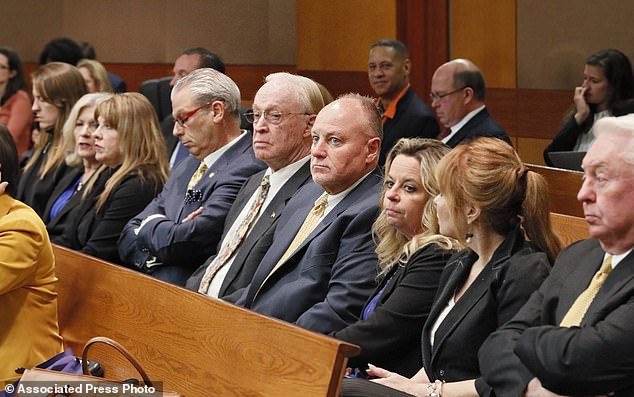Prominent Atlanta attorney who shot his wife dead as she sat in the front seat of SUV in 2016 could be released from prison NEXT YEAR after taking plea deal for involuntary manslaughter
A prominent Atlanta attorney who fatally shot his wife as she sat in the front seat of an SUV in 2016 could be released from prison next year after taking a plea deal to involuntary manslaughter.
Claud “Tex” McIver, 81, was convicted of murder and sentenced to life in prison in 2018. In 2022, that conviction was overturned by Georgia’s highest court, which ruled that the jury should have had the choice of whether to file an involuntary manslaughter charge. .
The once-prominent Atlanta attorney who fatally shot his wife as they rode in an SUV pleaded guilty to involuntary manslaughter in January and was sentenced to eight years in prison as part of a plea deal.
Now McIver will be “immediately eligible for parole,” attorney Amanda Clark Palmer told Fox News Digital.
“He will serve his final term in the fall of 2025, which means he should be released by that date,” Clark Palmer said in a statement. “Through parole, there is a possibility that he will be released sooner.”
Claud “Tex” McIver listens during closing arguments in a trial at the Fulton County Courthouse in Atlanta, April 17, 2018. The prominent Atlanta attorney who fatally shot his wife while she sat in the front seat of an SUV in 2016 could be released next years out of prison after taking a plea deal for involuntary manslaughter
‘Theoretically the parole board could decide to release him today, but in practice I think it will take several months for them to reach a decision as Mr McIver is not the only prisoner they have to assess and consider for early release. she added.
The Atlanta lawyer who claimed he accidentally shot his wife through a car seat was found guilty of murder in 2018.
Jurors found the then 75-year-old guilty of the September 2016 shooting of his 64-year-old wife Diane.
The jury also found him guilty of influencing witnesses and possession of a firearm during the commission of a crime and of aggravated assault.
The murder conviction carried a life sentence, and it remained up to the judge whether he would be given the option of parole.
No one has disputed that he shot his wife in 2016, but the defense had said the shooting was an accident.
Defense attorneys said during the trial that McIver loved his wife deeply and that the shooting was a tragic accident.
Prosecutors had said McIver deliberately killed his wife because he was in financial difficulties and coveted her money.
The McIvers were wealthy and well-connected. He was a partner at a leading employment law firm and served on the state election board.
She was president of US Enterprises Inc, parent company of Corey Airport Services, where she worked for 43 years.
Dani Jo Carter, a close friend of Diane McIver, was driving the couple’s Ford Expedition on the evening of September 25, 2016, as the three returned from a weekend at McIvers’ horse farm in Putnam County, about 75 miles east of Atlanta .

Friends of both defendant Claud “Tex” McIver and Diane McIver argue on the stand as the jury resumed deliberations in his murder trial Monday at the Fulton County Courthouse.
Diane McIver was in the front passenger seat and Tex McIver was in the backseat behind his wife.
With traffic heavy on the freeway, Carter left downtown Atlanta. A short time later, McIver fired the gun, hitting his wife in the back.
Carter drove to Emory University Hospital, where Diane McIver died.
During their second marriage, the McIvers were both wealthy when they married and kept their finances separate.
But the recent loss of his equity partnership in his law firm had dramatically reduced Tex McIver’s income and left him financially dependent on his wife.
Prosecutor Clint Rucker said in his closing argument in 2018 that McIver coveted his wife’s money and was better off with her dead than alive.
Attorney Bruce Harvey countered that the state’s case was full of innuendo and unfulfilled promises, characterizing it as an “accident in search of a motive.”
His co-counsel, Don Samuel, acknowledged that their client was far from perfect, but insisted that he loved his wife deeply and that it was illogical to think he would deliberately kill her.
